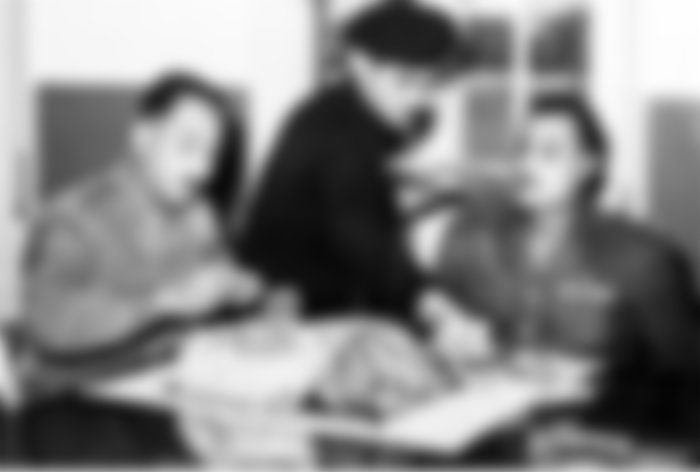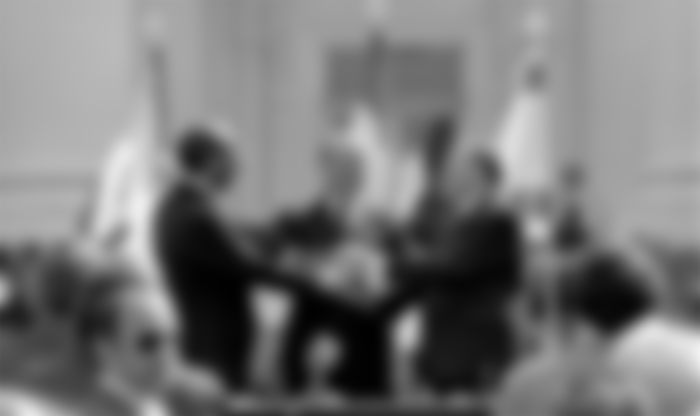Anwar el-Sadat was the President of Egypt (1970-1981) who in 1978 shared the Nobel Peace Prize for concluding peace agreements with Israel.

Born on December 25, 1918 to a family of 13 children in Mit Ab al-Kawm, Egypt, Sadat grew up in British-controlled Egypt. In 1936, the British established a military school in Egypt, and Sadat was among the first students. When he graduated from the academy, Sadat was given a government position, where he met Gamal Abdel Nasser, who would one day rule Egypt. The couple teamed up and formed a revolutionary group designed to overthrow British rule and expel the British from Egypt.

Before the group succeeded, the British arrested and imprisoned Sadat in 1942, but he escaped two years later. In 1946, Sadat was arrested again, this time after being involved in the assassination of pro-British Minister Amin 'Osman. Imprisoned until 1948, when he was released, upon his release Sadat joined the Nasser Free Officers organization and was involved in the group's armed uprising against the Egyptian monarchy in 1952. Four years later he supported Nasser's rise to the presidency.
In Nasser's administration, Sadat held several senior positions to eventually become vice president of Egypt (1964-1966, 1969-1970). Nasser died on September 28, 1970, and Sadat became president, winning that position forever in a national vote on October 15, 1970.

After becoming President of Egypt, he immediately initiated changes in domestic and foreign policy. It has launched an open door policy in the country, an economic program designed to attract foreign trade and investment. Although the idea was progressive, the move created high inflation and a large gap between rich and poor, fueling unrest and contributing to the January 1977 food unrest.
In foreign policy, he began peace talks with longtime enemy Israel. Initially, Israel rejected Sadat’s terms (which suggested that peace could come if Israel returned the Sinai Peninsula), and in 1973, Sadat and Syria built a military coalition to retake the territory. This action ignited the October (Yom Kippur) war, from which Sadat emerged with additional respect in the Arab community.

A few years after the war in Yom Kippur, Sadat resumed his efforts to build peace in the Middle East, traveled to Jerusalem in November 1977, and presented his peace plan to the Israeli parliament. Thus began a series of diplomatic efforts, with Sadat making concessions to Israel in the face of strong Arab resistance throughout the region. U.S. President Jimmy Carter mediated negotiations between Sadat and Israeli Prime Minister Menachem Begin, and a preliminary peace agreement from Camp David was agreed between Egypt and Israel in September 1978. Because of their historic efforts, Sadat and Begin were awarded the Nobel Peace Prize in 1978, and the resumption of negotiations resulted in a final peace treaty between Egypt and Israel — the first between Israel and an Arab country — signed on March 26, 1979.

Unfortunately, Sadat’s popularity abroad was matched by a new hostility towards him in Egypt and throughout the Arab world. He was a thorn in the side of the Arab ultranationalists The Islamic Jihad organization planned his assassination because of all this. Opposition to the treaty, the declining Egyptian economy led to general upheavals. On October 6, 1981, on Armed Forces Day, Sadat was killed by Muslim extremists during a military parade commemorating the Yom Kippur War in Cairo, Egypt.

The American partners informed the Egyptian side about the preparations for the assassination and the preparations for the coup attempt, so the Egyptian security services, in cooperation with the army, carried out mass arrests of members of Islamist groups throughout Egypt. But they also managed to get their men into the ranks of the army, moreover, into the military intelligence service itself. Eventually, the Egyptian Islamic Jihad organization, with the help of its people in the military ranks, managed to assassinate the Egyptian president.
During the parade in which he lost his life, President Sadat was secured with four security circles, and in his immediate protection he had eight members of the security service. The only weak point of security was the area in which the vehicles and soldiers involved participated by the way.

At the moment when the ceremonial tribune and the parade were flown over by the fighter planes of the Egyptian Air Force, trucks pulling long-range cannons were passing in front of the tribune.
Suddenly, a truck stopped and a team of assassins led by Lieutenant Khalid Islambouli jumped out of it. As he resolutely approached the tribune guests and the security was confused, President Sadat himself thought it was part of the protocol and that the officer intended to file a complaint with him so he stood up. Arriving at the tribune, Islambouli took off his helmet and took out three hand grenades, which he threw at the president and other guests. Only one exploded, far in front of Sadat, after which the assassin opened fire from a machine gun of Egyptian production "Port Said" of 9 mm caliber.

The tribune was approached by three more assassins who jumped out of the truck and they opened fire from assault rifles. The attack lasted two minutes, and President Sadat died of his injuries at the hospital two hours later. In addition to Sadat, a total of ten people were killed, including Oman's military envoy, and 28 were wounded, including Vice President Hosni Mubarak, the Irish defense minister and four military liaison officers. Security forces responded within 45 seconds and one attacker was killed and three, including Islambouli, were injured and arrested. The assassins were sentenced to death by a military court and executed by firing squad in April 1982.







